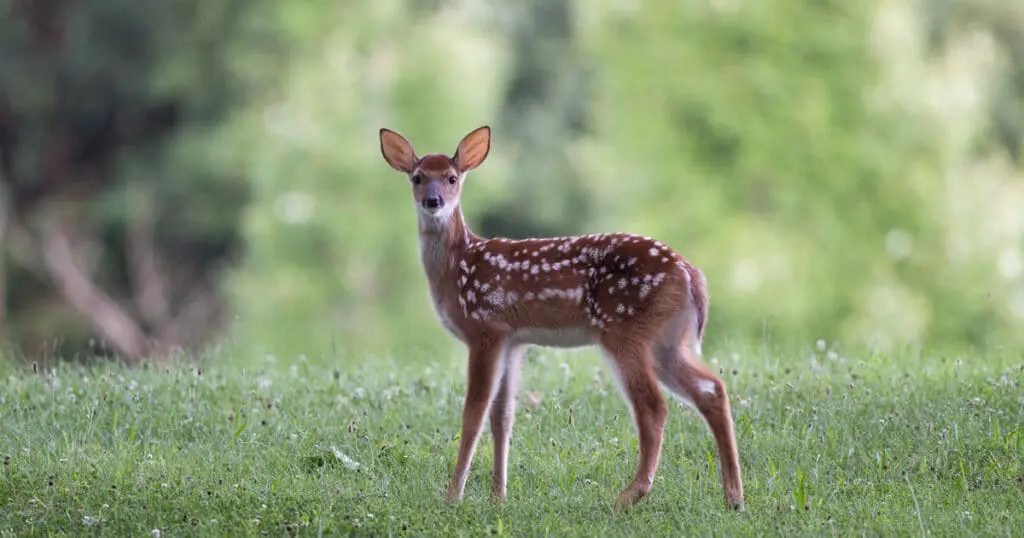Baby whitetail deer are known as fawns. As a deer hunter, or even just a casual observer who appreciates nature, there are times when you’ll want to estimate a fawn’s age. Let’s find out what factors will help you do just that. Keep reading to discover how to tell how old a baby deer is.
Here’s an overview of what we’ll explore here:
- How can you tell a deer’s age?
- How old is a fawn when it loses its spots?
- How long do baby deer nurse?
- Physical attributes that can help you determine a fawn’s age
- What a fawn’s behavior can tell you about its age
- Season can help you age a fawn
- Brief timeline of a deer’s first year of life
How Can You Tell a Deer’s Age?
Table of Contents
ToggleThere are certain factors to consider if you want to tell a deer’s age. These include physical and behavioral characteristics.
Physical attributes include the coat, the leg shape, and whether there are pedicles on a male fawn’s head.
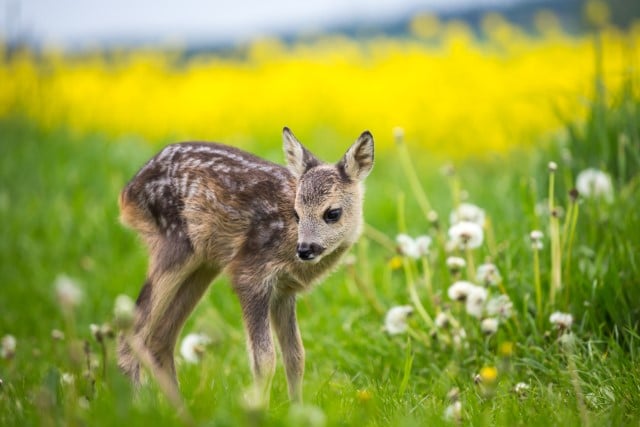
You can also examine their teeth – a great way to age the deer. But you cannot do this from a distance.
When it comes to behavior, very young fawns will try to hide from predators instead of running.
The time of year when you see the fawn will also help you estimate its age. Most deer are born in the spring.
How Old is a Fawn When it Loses its Spots
The white spots on their coats are an important defense mechanism for fawns.
One of the main distinguishing factors for deer fawns is their reddish-brown coat that is speckled with white spots.
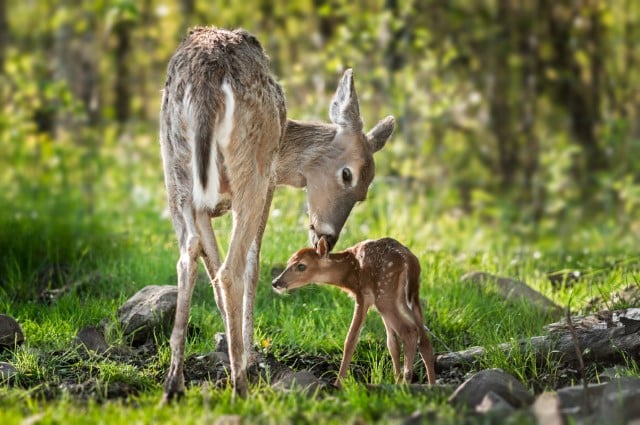
The speckled white spots imitate the look of dappled light from open spaces among leaves and trees.
Baby deer shed their first coat by the time they’re six months old.
After their baby coat, deer grow thicker new, grayer fur, ready for the winter.
Fawns start losing their spots when they’re around 4 months old. For most deer species, the white spots are completely gone by the time these animals are half a year old.
However, deer such as the Chital, Sika and Fallow deer retain their white spots for a bit longer than usual or even for the rest of their lives.
How Long Do Baby Deer Nurse For?
Like every mammal, does (female deer) will nurse their offspring. They usually give birth during the spring.
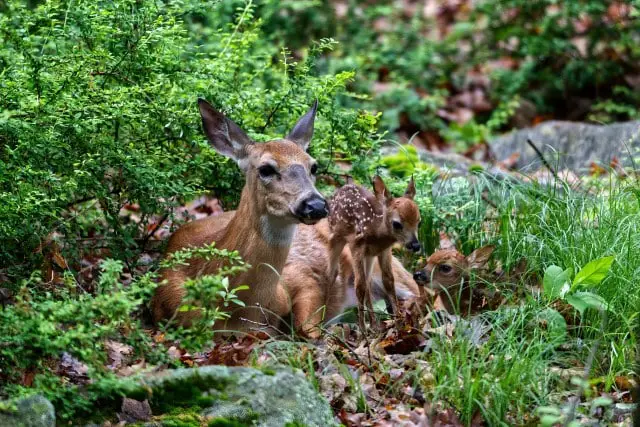
Once fawns are out of the womb, the mother deer will nurse their fawns for up to two months. After that, the fawn will be weaned, but they will still remain close to their mother.
How long a fawn stays with its mother will depend on its gender.
Male deer stay with their mothers for about a year. Female fawns may remain twice as long.
Physical Attributes That Can Help Determine a Fawn’s Age
There are many physical attributes that can help a person determine what the fawn’s age is.
While one of the easiest ways to tell a fawn’s age is to go up close and personal, with practice, most people can determine the age of a fawn from a distance.
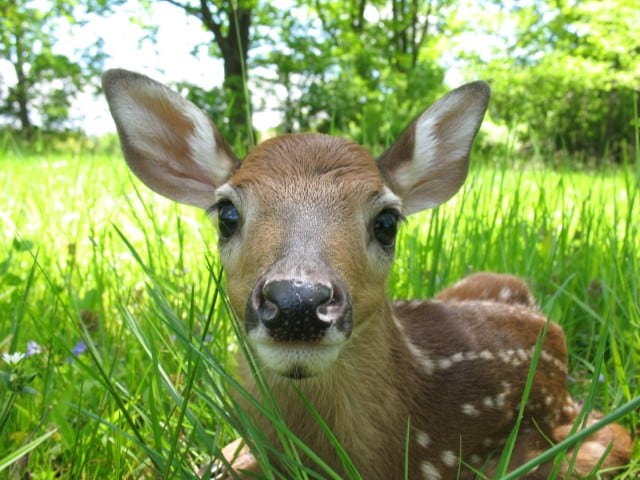
These are the ways to calculate a fawn’s age through physicality:
White Spots
Normally, a fawn will have white spots, which start to shed when the fawn is around 4 months, and it is completely shed around 6 months.
The white dots are speckled as a series of two rows, running down their backs. Their fur will also be reddish-brown.
Gait
Watch for the gait of a fawn. Younger fawns have thinner legs and so are more wobbly at the start of their lives.
Deer, which are known for having thin legs, actually develop stockier and thicker legs once they are around two years, so the thinner the legs, the younger they will be.
Pedicles
Watch out for pedicles on the head. They start forming around four months. These points harden and become more noticeable once the fawn is around 7 months.
Neck
Younger bucks will have thinner necks.
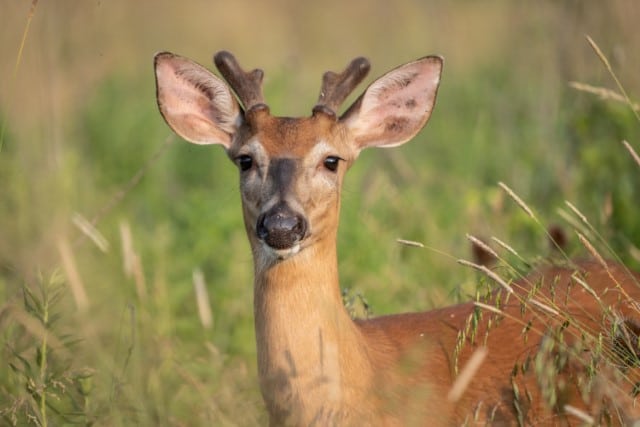
Umbilical Scabs
Umbilical scabs can tell you if the fawn is less than a week old. If you feel a scab, it means the fawn is young. These scabs fall off when they dry up after the fawn is born and that takes about a week.
Teeth
If you’re close enough, try to check for their teeth. The development and growth of their teeth give a lot of information about how old the deer is.
Deer also start their life with baby teeth and gradually all are replaced with a permanent set of teeth. A fawn has around 4 check teeth by the time it is 6 months old.
Around 7 months to a year, the fawn will have 5 check teeth.
Weight
Estimate the size and weight of the fawn. They will look smaller, and less heavy than adult deer.
What Fawn Behavior Can Tell you About its Age?
As touched on earlier, a deer’s behavior that can help you age a deer is whether the fawn hides or runs.
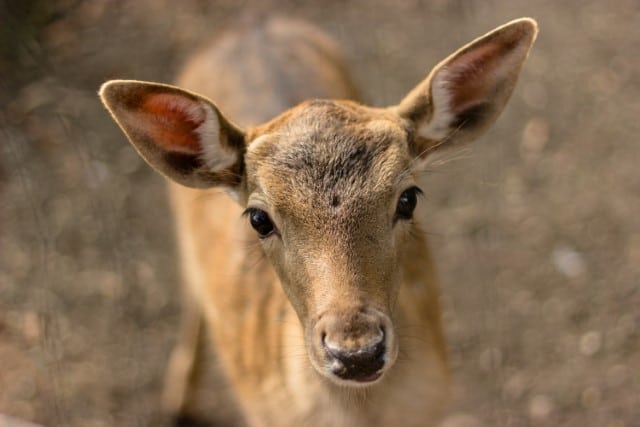
Study the way the animal hides. If you see a fawn that’s covered in bushes and leaves, it’s likely to be a newborn left by its mother to hide.
If a fawn is less than a week old, it will not run away if you startle it. It will freeze. The mother will return periodically to nurse its offspring – but by moving away, the adult deer’s scent doesn’t attract predators.
Older fawns will sprint away from predators when they sense danger.
Season Can Help You Age a Fawn
Female deer typically give birth in the spring. While there are exceptions and fawns are occasionally born in the summer, it’s not common.
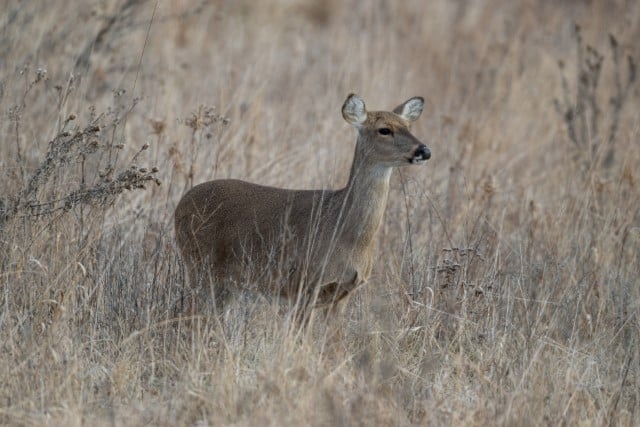
Fawns usually eat leaves, wild fruits, mushrooms, and bark, and depend on their mother for nursing in the first few months of their life. If you see a fawn, wait to see if the mother is returning. This usually happens at night.
A fawn that is still nursing is usually younger than 3 months old.
Brief Timeline of a Deer’s First Year of Life
Here’s a timeline chart with information on deer’s first year of life.
| Age | Description |
|---|---|
| First 20 minutes | The newborn fawn learns to stand. |
| First 1 week | The newborn hides in vegetation and suckles on its mother whenever she returns. |
| First 2 weeks to one month | Fawns are still too young to start grazing. |
| 2 to 3 months | Fawns stop nursing. |
| 4 months | Fawns start losing their white spots. |
| 6 months old | Fawns become more socially active. They lose their white spots completely after having shed their fur for the first time. They have grown about 4 teeth. |
| 7 months old | Fawns have grown about 5 teeth. |
| 1 year old | The fawn becomes a yearling. |
Final Thoughts: How to Tell How Old a Baby Deer Is
There are several ways to estimate a baby deer’s age. As we’ve learned here, you can look at physical and behavioral traits, as well as the season.
Now you know how to tell how old a baby deer is, why not learn about the life cycle of deer right here?

